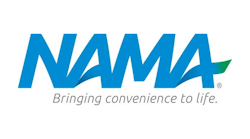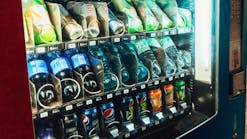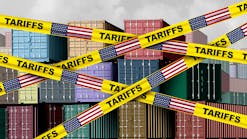Very few things of worth can be accomplished alone. Usually, it takes the voices and efforts of many to make real and lasting change. The vending industry is no exception. While having a national association such as NAMA — the national association for the retail vending, OCS and food service industries — is an important element, for the industry to be successful the partnerships and advocacy must also start very close to home.
Whether it’s called a grassroots effort or state association, the need and benefit of local business owners working together cannot be overstated. Members are able to influence laws and regulations that directly affect their operations, learn from experienced operators about everything from driver retention to warehouse management and benefit from a central place to see and ask about the latest products and services available.
Issues usually inspire advocacy
Dan Holt Jr., president of Lincoln County Vending in Fayetteville, TN, joined the Tennessee Automatic Merchandisers Association (TAMA) in 2005 because the state was going through the highest vending tax increase in its history. He knew he needed to act and get in touch with legislators. “What we [were and] are trying to do is make them aware of who we are and what we do — and they notice,” said Holt Jr. Legislators know who TAMA is and that does wonders for the association’s legislative efforts. In fact, there hasn’t been a large issue like the tax increase since then, but that doesn’t stop Holt Jr., who is former TAMA president, and other members from traveling to the state capital for an annual lobby day. “I highly suggest that all vending operators participate in their state lobby days,” said Holt Jr. “It is an amazing experience and is an important part of what we do as business operators.”
State lobby days are usually an integral aspect of the state association annual meeting. They are different in each state, but the goal of what they aim to accomplish is the same.
“The purpose is to show legislators the impact of the industry in their state,” said Eric Dell, senior vice president, government affairs for NAMA. The specifics of a lobby day, however, differ by state. Dell cites some Southern states for examples. In Mississippi, the association goes to the statehouse and has a meal. Usually they will host a member of the legislature to come and speak. This is different than Georgia where they will go to the capital and provide legislators with samples of products traditionally sold in vending; emphasizing the Georgia-made products. They hang banners and promote informed consumer choice with FitPick. South Carolina, however, has a rule against giving away any gifts, even a cup of free coffee to legislators. “You have to look at the ‘ethical rules for gifts’ unique to each state,” said Dell. Those rules dictate, in part, how the lobby day is run.
Despite the different ways in which states perform advocacy with lobby days they are invaluable to a national organization such as NAMA. “It’s difficult to have an effective national government affairs office without the work of state associations,” said Dell. “States are territorial and don’t appreciate lobbyists from other states telling them what they should do.”
This also means that each state association recruits and pays for its own lobbyist that fights for the vending industry on a local level. The lobbyist represents the state association’s interests and attempts to influence legislators and officials for the betterment of the industry, much like a lobbyist in Washington, D.C. representing the interests of the national association.
“Many things happen on a local level especially when it comes to regulation or legislation,” said Pam Gilbert, director of association services for NAMA. She is on the front lines with the state associations providing support. “That is why the state associations are so important. They are really the grassroots of advocacy.”
Often when an issue comes up that will affect vending on a national level, NAMA staff such as Sheree Edwards, regional legislative director and Sandy Larson, senior director and counsel, will enlist the help of state association members to educate and inform their local legislators about the issue’s effect on their businesses.
Many and ever-changing battles
“I think it is important to be a part of the state level association because many of the important issues that face the operator are handled on the state level,” explained Elliot Teitelbaum, president of Tri-State Automatic Merchandising Council (Tri-State) as well as president of Elliot’s Vending Company, Inc. in Huntingdon Valley, PA. Specifically in Pennsylvania, operators enjoy certain sales tax exemptions on products sold through the vending machines. “These exemptions came from hard work and lobbying on the state level,” said Teitelbaum. Tri-state has been instrumental on other issues in the past few years as well, including ADA rulings, local level machine taxes and helping to beat a Philadelphia ‘sugar’ tax on soda which never got passed, according to Teitelbaum. “Engaging with the state level legislators is not always us asking for something in return, but more importantly, us trying to explain our industry and how we conduct business on a daily basis,” he said. “At the state level we work on legislative items that are usually critical to our bottom line.”
“Another very important component to a state association is the speed that actions can be made,” said Carl Moser, sales manager of Cardinal Canteen Food Service and past president of the Virginia Automatic Merchandising Association (VAMA). “If there is an urgent situation that needs to be fixed, a lot of the times we can make it happen extremely fast,” he added. VAMA is not one of the state associations chartered by NAMA. Instead, it is an independent organization that partners with two other independent state associations for a trade show and educational seminars.
More than advocacy
For Moser, state associations promise a brighter future for companies and employees, but not just because of the advocacy efforts. “I am so glad I made that choice to serve, because I have met so many great people and have also learned so much invaluable knowledge,” said Moser after 16 years on the board of VAMA, which joins with the North Carolina Vending Association (NCVA) and South Carolina Vending Association (SCVA) to hold the Atlantic Coast Expo (ACE) each year. “As the show has grown the last few years we have brought in more people outside the three state radius and we have also brought in additional new exhibitors. All of this involvement has really helped me personally and professionally to prosper over my 23 years with my company. I think it is absolutely essential for anyone in our industry to get involved and volunteer time and money to their state.”
Just as individuals coming together are powerful in a state association, unity between associations also brings more opportunity, such as the NAMAOneShow and the resources the national organization can provide to states or regions.
Gilbert and her other association services staff, Marilyn Dent and Deborah Lara, provide assistance in the NAMA chartered state councils in whatever way is needed. “Most state associations have their own educational seminars,” explained Gilbert. These include a NAMA representative updating the members on the industry as well as a speaker on a specific topic, whether it’s about a specific aspect of vending business or a motivational speaker. When asked, Gilbert and her team will coordinate the speakers.
Networking is also an important part of state association events, allowing members to socialize with operators and suppliers as well as develop mentoring relationships. The amount of involvement from Gilbert’s team varies. Some associations ask for management services such as membership and coordinating the events, while others run more independently. “Each of our 31 state councils have a very different personality,” said Gilbert. Most were formed in the 1960s through 1980s and have all grown organically requiring different levels of support. Depending on the size of the association and the level of support, NAMA charges state associations a fee for the services.
Gilbert says her favorite part of working with the state councils is that it allows her that personal connection with the industry. “When I go to a state association meeting, I’m struck by how these board members are very committed and active. It’s very interesting to see competitors in the marketplace come together and work together on behalf of the entire industry in that state,” she said.
Support from the whole
Holt Jr. experienced firsthand the support of Gilbert’s team. “There has always been a NAMA representative there to help us at lobby days and at our meetings,” he said. With all the good from the national level and the fellow operators, Holt Jr. can’t stress enough the importance of advocating for this industry. “If you’re part of the vending industry, you need to support it,” he said. “You’re going to benefit from other people’s advocacy, so you should be part of the cause, too.”
State associations provide an invaluable resource where like-minded business owners with the same goals can come together and learn from each other as well as merge their voices to fight for the industry as a whole.
5 Reasons To Be Part Of Your State Association
Ever changing issues: Legislators are constantly evaluating new laws and regulations that will help their constituents. These rules can have unforeseen consequences for a specific business, like vending, so it’s important for a group of people to be aware of what bills are being brought up and lobby for or against them.
Direct effect – regulations and legislators: Because operators are both business owners and constituents for legislators, their voices are powerful. Talking directly about how a local bill will adversely or positively affect your business, or simply educating a representative about the industry can have a noticeable impact.
Mentoring: Every operator who has been part of a state associations talks about the value in meeting others with the same goals and challenges. Working together and networking can lead to stronger, long-lasting vending operations.
Professional development: Associations can provide the opportunity for education on subjects important to the industry from recent trends to sales motivation.
Tradeshows: Being part of an organization often means being able to attend an event where attendees can see the latest products and services as well as meet with suppliers and ask questions.

Emily Refermat
Emily began covering the vending industry in 2006 and became editor of Automatic Merchandiser in 2012. Usually, Emily tries the new salted snack in the vending machine, unless she’s on deadline — then it’s a Snickers.
Emily resigned from Automatic Merchandiser and VendingMarketWatch.com in 2019 to pursue other opportunities.






